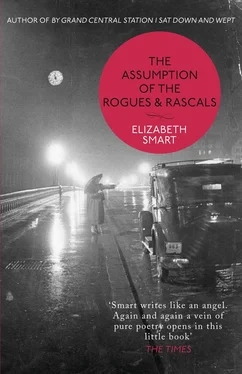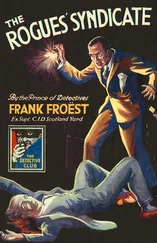Elizabeth Smart
The Assumption of the Rogues & Rascals

Fourth Estate
An imprint of HarperCollins Publishers
1 London Bridge Street
London SE1 9GF
4thEstate.co.uk
This eBook first published in Great Britain by Fourth Estate in 2015
Paperback previously published by Panther Books 1980 and Paladin 1991
First published in Great Britain by Jonathan Cape Ltd in association with Polytantric Press 1978
Copyright © the literary estate of Elizabeth Smart
The Author asserts the moral right to be identified as the author of this work
A catalogue record for this book is available from the British Library
Cover photograph © Charles Hewitt / Hulton Archive / Getty Images
Author photograph © Georgina Barker
All rights reserved under International and Pan-American Copyright Conventions. By payment of the required fees, you have been granted the non-exclusive, non-transferable right to access and read the text of this e-book on-screen. No part of this text may be reproduced, transmitted, down-loaded, decompiled, reverse engineered, or stored in or introduced into any information storage and retrieval system, in any form or by any means, whether electronic or mechanical, now known or hereinafter invented, without the express written permission of HarperCollins
Source ISBN: 9780008155742
Ebook Edition © August 2015 ISBN: 9780008155759
Version: 2015-07-10
Table of Contents
Cover
Title Page
Copyright
Part One: After the War
This Is the Scene
Part Two: Signed on for the Duration
Part Three: Working
Part Four: Bearing
Part Five: The Assumption of the Rogues and Rascals
Part Six: Kinship Is Established
Paving-Stones Play the Part of the Water Snakes in the Ancient Mariner
Sometimes Pity Seeps in Even for the Self-Pitying
A Publican’s Wife Tells Her Story
Part Seven: Lament of a Maker
Part Eight: Caught Up With the People and the Dangers They Have Passed
A Bad Night in Soho
At Grips With a Boss
At Grips With a Vicar
At Grips With a Psychologist
Part Nine: The Story of Our Life
Part Ten: Fear of Failing
A Strange Dream
A Forgotten Canadian Calls
Part Eleven: On, on
Trying to Write, Trying to Survive
Part Twelve: Pacification
Acknowledgments
By the Same Author
About the Publisher
After the War
Wandering in the wastes of Kensington, the mean mad faces pass like derelict paper bags. The neat ruins of the war lie like a boring scar, whose history is all of the repetitive future, and all that memory can retain.
It is the autumnal equinox that blows out the pleats of my old tweed skirt. The moon races behind the tall and interminable wilderness of Onslow Gardens. All that was held in by courage and the ardour of people’s prayer to be good is loose now, and makes a lunatic and evil ghost to lurk in the trodden Squares.
There is no gas; there is no fuel; there is very little food. Also, there is still the demand for our pity for the poorer, the colder, the hungrier.
Cats are the freest beings, for very few people bear them any resentment. The foolish dogs waddle and trot about, unaware of how indelicately they expose the regrets and longings of their owners. The cheap sparrows peck about in the dust.
This is the scene for the drama which we are now too tired to perform. Christ how tired we are. Every article in the great cold room of the landlady’s flat has a different floral design. There are only remnants left over from her previous lives. She is making a fresh start in a rehabilitated house, which was only slightly damaged by blast, and now is made into flats. But really she is unable to make a fresh start, and her tired heart spends its holiday from the queues moping about her daughter who is in Leeds, waiting for her second baby to be born and her husband to be demobbed. The appearance of my landlady’s hope is only reflex action.
Women with strained faces are slapping their babies for relief.
The time of repentance is come. Soon even the most obtuse will be able to observe the wickedness of war. Repentance – but also reparation. We will REPAY. It is guilt that blows icily around corners with the autumnal equinox. The predatory suspicion is dogging us that we cannot, can never, escape the consequences of our orgies. When the door slams during the cinema we realize that there is no retreat. We are meek when bus-girls admonish us, because we are aware of how wrong we have been. But our mildness and our inconspicuous behaviour and our passive resignation will not deceive the Furies. They are adamant, oncoming, and, I fear, we fear, we know , will be overpowering.
For we are not massed for victory, and our subjective passions have not made a large image of righteous indignation to be our mirage and our guide. O Führer of self-love and self-hate, whose false moustaches fooled us into thinking he was not us: where is your twin enemy with the terrible banner of peace?
But even this invocation sounds too highfalutin for the times – out of place. I am, after all, just a woman in a fish queue, with her bit of wrapping paper, waiting for her turn. I wouldn’t budge an inch out of line for faith, for hope, or for glory. History is in the fishmonger’s hands, and I will be grateful for the stale allotment he allows.
Rising rapidly up the steps of the moving bus, I will not be too proud to mind if my landlady, my boss, or my lover, see the great hole in the heel of my stocking. Vanity has become a burden, and I think desire has failed too. On Bruton Street I saw a lady glancing sideways at the lingerie, with only a mild daydream about what would happen to her if it were hers; not, as it used to be, with the greed that begets action.
I meet kindness, sometimes, but very soft and autumnal it glimmers out in gratitude for an invocation of memory: of a child smiling, of a woman joking, for instance.
And hourly, yes, at every timeless hour, redundant and obsolete, the witches increase in Kensington, as one more woman becomes too weary to go on; too weary to dispel the glaze that has settled over her eyes. They crawl into their holes, where the gas no longer functions.
And winter is coming on.

Signed on for the Duration
This is the scene outside, and it seems to synchronize with the scene within, for it is not at all what a five-year-old child would have seen, chasing his ball in a still-green Kensington Gardens; or what an old man would muse on, sitting in his club, having weathered both kinds of war, and forgotten them all.
But these two categories are outside the story, merely the cosy covers of the book.
What is to happen now?
Out of this weary landscape, girding your strengths around you, you are to step through a couple of decades with your children on your back, singing a song to keep them optimistic, and looking to left and right. For the right and not for the left.
Left right, Left right.
Are you a friend to me, sergeant-major con-science, strictly insisting on keeping in step with the true, the true, the true that you once knew, and not the invented possibilities that reeled in front of your reeling mind when the lightning lit up everything?
Читать дальше














